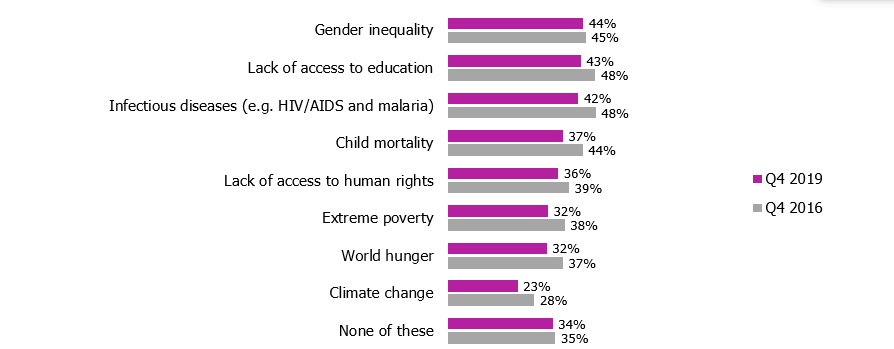The UN 2030 agenda for Sustainable Development (SD) outlines 17 goals that its member states should achieve jointly to tackle the most pressing social challenges. These include the termination of global poverty, hunger, gender inequality as well as taking urgent action for climate change, education as well as health and well-being.
In this context, in October 2019 we investigated the British public views of international development and overseas aid, along with a number of global problems which are also included in the UN SD Goals.
While helping people in Britain is a priority, there is strong interest in overseas affairs
When asking the public about the British course of action, the majority believes in helping those living in Britain first (70%) and that government spending on overseas aid should be decreased or stay the same (34%). Yet, 60% of the public shows interest in what happens overseas and 52% takes action by buying fair trade and ethically sourced products when possible, and 72% believes that international cooperation should increase to solve global problems. As the British situation worsens due to Covid-19, an increasing number of the public will likely prefer helping their UK nationals first. This may represent a risk for future donations which should be taken into account. As such, it is crucial for charities to make the most of public interest, openly communicating the state of the sector and the impact of their work while differentiating their methods of donations and appeals.
The public is well-informed of the state of several global issues
Before the Covid-19 pandemic, we also investigated perceptions of global problems to find out what the public thinks has been achieved over the past twenty years and their expectations for the next twenty. While gender inequality and infectious diseases (e.g. HIV) are two of the issues perceived to have improved the most with half of the public believing that, the general public sees climate change, extreme poverty and world hunger as the issues which have worsened the most (57%, 34% and 32% respectively). Public perceptions on these issues are in line with the latest developments that see improvements in gender equality and health and well-being along with a decelerating pace of poverty reduction and increase in world hunger in the last couple of years. This could be a success story for the sector as it may be a signal that international development organisations successfully communicated the state of the sector to the public.
A decreasing portion of the public thinks global problems are improving
As for public expectations for the next twenty years, the perception that global problems are improving has fallen since 2016. Pessimism about the future reigns in the area of climate change with only 23% of the public thinking this will improve while optimism characterises gender inequality, access to education and infectious diseases (before Covid-19). As developing countries are at higher risk during the global pandemic, public perceptions of the future of global issues are likely to be negatively impacted. It will therefore be crucial for international development charities to assess the effects of these negative perceptions on donations as well as clearly communicating the importance of their work to encourage support and passion for the cause (e.g. charities may benefit from tracking their work and publicising this).
Chart 1: Public perception that global issues have improved has fallen since 2016

“Do you feel that each of the following global problems are likely to get better or worse over the next twenty years?” It will improve a lot + It will improve a little
Source: Charity Awareness Monitor, Oct 19, nfpSynergy | Base: 1,000 adults 16+, Britain
International development charities face financial hardship when they are needed the most
Pessimism surrounding the developments of several global issues along with the additional challenges brought by the global pandemic has put increasing strain on international development charities. These charities will soon face historic proportions of famine, extreme poverty, diseases and increased violence with a worsened financial position. In fact, even before the global pandemic hit, some international development charities saw their incomes fall due to scandals and faced strong uncertainty because of Brexit. This situation is increasingly worrying when considering the current economic crisis and that less than 2% of UK funding of its Global Humanitarian Response Plan has made it to NGOs so far due to delays. Besides, DFID becoming subsumed into the Foreign and Commonwealth Office represents an additional risk for the international development sector. In fact, charities condemned the move as detrimental for UK foreign aid and the National Audit Office also warned that apart from DFID, the other departments were lacking transparency on the effectiveness of how they were spending UK aid.
It is a decisive time for the sector
Although there have been improvements, several global problems have recently been worsening or improving at slower rates and they will likely deteriorate because of the pandemic. Along with pessimism about the future of climate change, since 2016 the portion of the public that thinks global issues have improved is decreasing. As the impact of Covid-19 will bring devastating consequences in developing countries which particularly lack access to resources to deal with the socio-economic consequences of the pandemic, the international community bears a fundamental role. Leaving no one behind will be only possible if national governments come together and put in place bold measures.
It is at this crucial time for the sector that Covid-19 has severely hit charities putting their futures at stake and that the UK Government decided to subsume DFID into the Foreign Office, underplaying warnings of the effectiveness of its aid spending. In this context, international development charities need to make their voices heard and ensure that the UK Government keeps on spending UK aid on developing countries’ interests rather than using this budget for the promotion of British interests abroad. Also, as optimism about the future of global issues diminishes, international development charities need to be clear about the huge risks developing countries are facing and the importance of their support right now. Communicating transparently to keep the public engaged and aware, showing supporters that international charities’ projects are achievable and making one’s voice heard is key. Besides, as shown by the data of the public preferring to help people in Britain first while taking action through ethical and fair-trade purchases, framing is important. It is therefore worth considering new strategies to frame international development work in a way that is more appealing to the public. For instance, as the public would like UK aid to be reduced or stay the same, international development charities should be reminding the public of the achievements UK aid has made as well as its size relative to other government expenditures, such as the 2% spent on defence.
If you are interested in learning more about this research get in touch with our team at insight@nfpsynergy.net

